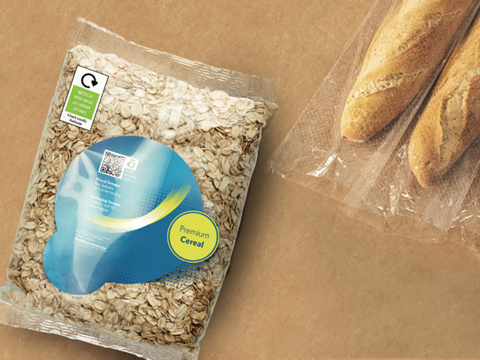
Greenback Recycling Technologies and Amcor aim to convert post-consumer flexible packaging into pyrolytic oil for food-grade plastics by installing an advanced recycling module at Amcor’s Heanor facility.
Greenback’s Enval advanced recycling technology is reportedly able to process both mono-material and multilaminate flexibles, turning both into ‘high-quality’ pyrolytic oil.
Financed by the Alliance to End Plastic Waste, the six-month commissioning and trial phase at Amcor’s facility in Heanor, UK, is set to focus predominantly on household waste and demonstrate how co-locating modular recycling units within existing industrial infrastructure could help facilitate a circular economy.
The eco2Veritas traceability platform will be used to verify the entire recycling process, capturing process data from the receipt of waste to the production of oil via AI and IoT devices. The oil will then carry a digital certificate of provenance through the value chain, providing data for mass-balance allocation as the oil is converted into recycled plastics.
If the trial is successful, Amcor has expressed interest in installing additional modules at both its Heanor site and beyond, potentially unlocking a fully circular solution for flexible packaging.
“This partnership demonstrates the power of collaboration in driving scalable circular solutions,” said Philippe von Stauffenberg, CEO of Greenback. “Hosting this module at Amcor’s Heanor site will enable real-time feedback from global experts, as we refine our system for maximum impact before expanding further.”
“We are excited to host this pioneering technology at our Heanor site,” added Andrew Green, vice president, Amcor Flexibles Europe, Middle East and Africa. “Combining Greenback’s innovation with Amcor’s operational experience enables us to improve circularity for soft plastics and help our customers make progress in achieving their own sustainability targets.”
All the way back in 2023, Greenback worked alongside Nestlé Mexico to turn ‘hard-to-recycle’ plastics into pyrolytic oil using Enval technology. It sought to process the flexible plastic packaging waste generated by 250,000 people every year, including aluminium in multi-layered flexible packaging, in a low-emission recycling process.
Since then, Plastic Energy has announced its conversion of ‘hard-to-recycle’ post-consumer plastic waste into pyrolysis oil at its Geleen facility; this oil will be used to produce food-contact packaging, medical plastics, and more. The technology has apparently been demonstrated at an industrial scale and is anticipated to plug directly into the existing plastics value chain.
If you liked this story, you might also enjoy:
The ultimate guide to the Packaging and Packaging Waste Regulation in 2025
How are the top brands progressing on packaging sustainability?
Everything you need to know about global packaging sustainability regulation in 2025
The key to increasing the use of reusable packaging in supermarkets


















No comments yet